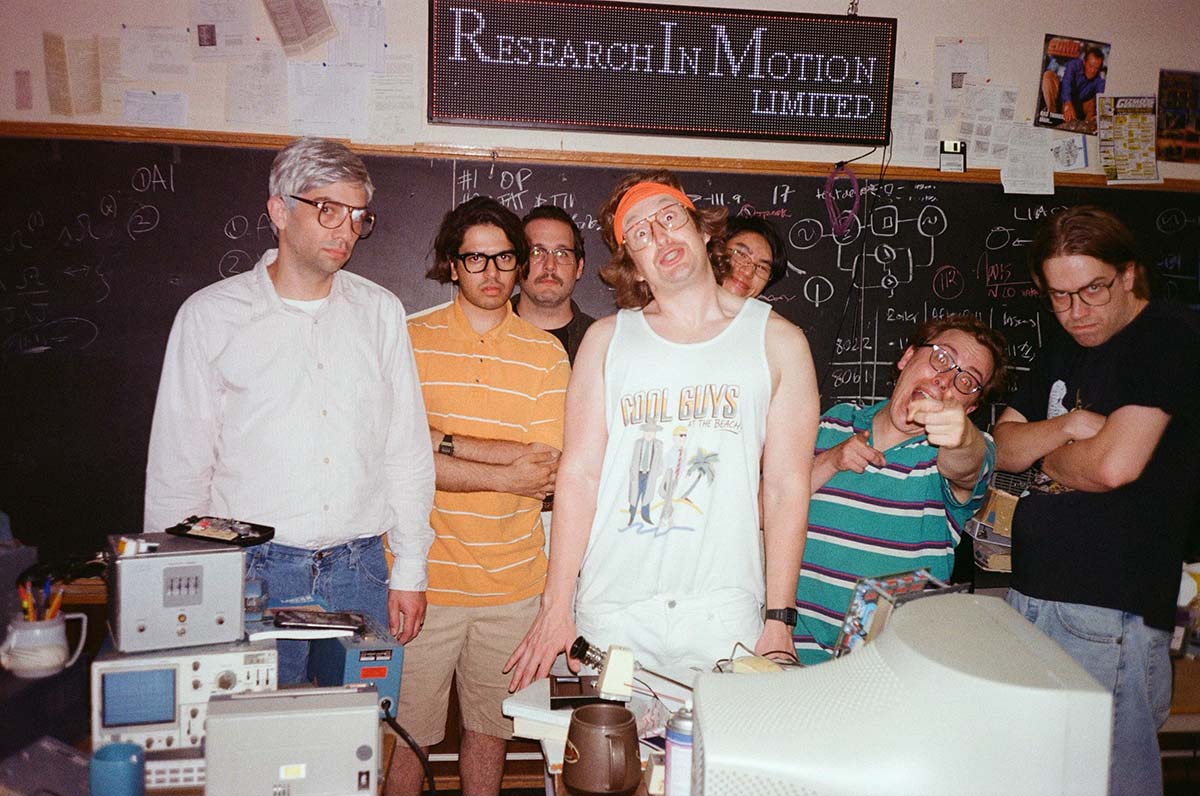Chances are high that, if you are reading this on the go, you are doing so on your iPhone. Apple, which first introduced the phone in 2007, now holds a whopping 24% share of the smartphone market, meaning that out of every four phones sold today, one is an iPhone. This dominance, although remarkable, pales in comparison to the height of the BlackBerry fever. The BlackBerry did in 1999 what was only possible in sci-fi movies until then: it made computers fit in the pockets of everyday people. With the enticing sale of a “pager capable of email,” the phone held almost 50% of the market in its heyday.
So how come a company that once had almost half of the portable phone market became virtually unknown to the young people who now queue for days on end to purchase Apple’s latest? That’s the question Matt Johnson’s new film “BlackBerry,” playing in Competition at the Berlin International Film Festival, sets out to answer.
Based on Jacquie McNish and Sean Silcoff’s best-selling book “Losing the Signal: The Untold Story Behind the Extraordinary Rise and Spectacular Fall of BlackBerry,” Johnson’s film chronicles how a group of Canadian geeks fundamentally changed technology as we all know it now. Jay Baruchel is Mike Lazaridis, the founder of Research in Motion, a tech company brewed in a small office in Waterloo, Ontario. Johnson plays his founding father and best friend, Doug Fregin. Joining the trio of protagonists is Glenn Howerton as Jim Ballsillis, the Harvard graduate who takes this small, amateurish operation and markets it to the moon.
The main trio, all from comic backgrounds, plays each character in stark contrast to one another, granting “BlackBerry” a dynamic pace amplified by Johnson’s stylistic mockumentary-style cinematography. The film is built almost entirely of unfocused close-ups and dramatic zoom-ins, a choice that originally functions as “The Office” on steroids but eventually settles into not only a nifty comedic device but an apt framing choice for a cast primed to silent acting.
This tricky intersection between comedic timing and dramatic believability is precisely where Glenn Howerton excels, his now infamous line deliveries as Dennis Reynolds in “It’s Always Sunny in Philadelphia” one of the greatest gifts of modern comedy. He brings this same untethered rage to Jim, a shark who spent most of his life trapped in the claustrophobic aquarium of mediocrity. Hungry for success, the businessman jumps on the promise held by this group of nerds who is much more concerned with memorizing the lines to Steven Spielberg’s “Raiders of the Lost Ark” than dealing with the ins and outs of building a thriving business, the dichotomy between Mike’s meekness and Jim’s command fuelling both Research in Motion’s ascension and demise.
Baruchel holds his ground against the scene-stealing Howerton, competently embodying Mike’s evolution from Spielberg aficionado to Julian Assange-looking mogul. The actor conveys reticence without ever leaning onto the tired tropes of the defenseless prodigy. Lingering somewhere in between arrogant confidence and pained restraint is Doug, played by Johnson almost in an autobiographical manner, with many of the character’s traits openly plucked from the director’s own.
While other films set within moments of significant technological breakthroughs suffer from the weight of the hyper-exposed public personas of tycoons such as Steve Jobs and Mark Zuckerberg, “BlackBerry” makes the most out of the lesser-known figures behind the clickety gadget. Johnson is not as concerned about having his cast emulate real-life people as he is about allowing the actors the space to interpret what is on the page, the lines between fact and fiction conveniently blurred to accommodate the director’s ambitions.
Most of all, “BlackBerry” succeeds in encompassing a reality often exposed but rarely understood: how a love of fiction often fuels technological advancement, with late nights shared over sci-fi classics building not only a community but a desire to emulate what was once only possible through the screen, nostalgia far from equivalent to immaturity. The walls of the cluttered Reality in Motion offices are covered in 80s posters, from “The Goonies” to “Serpico,” with inboxes unmanned every movie night.
From this notion, Johnson cleverly tackles how tech companies evolve from safe havens to toxic work environments once this initial innocent passion is corrupted into a money-making machine, a pattern doomed to condemn those all willing to repeat it. It is a loving — and highly entertaining — ode to the outcasts who dream of nothing more than a life filled with fixing whirring gadgets and afternoons spent in “Star Trek” matinees. [A+]





